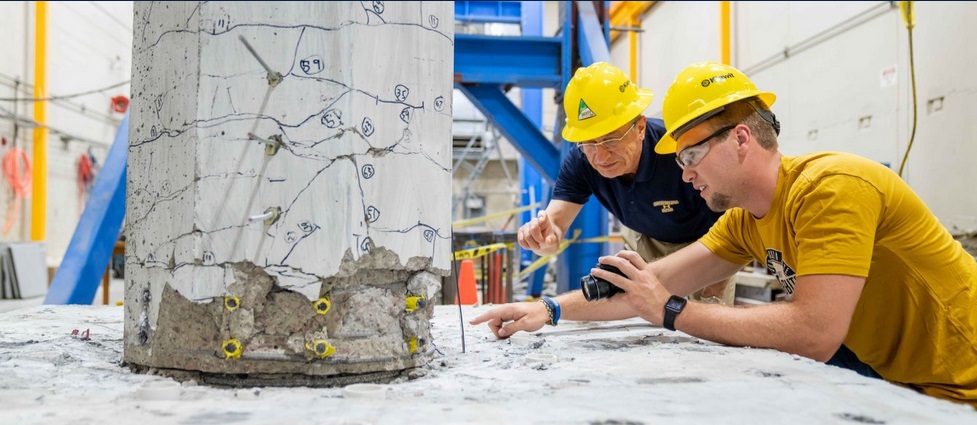| |
| |
Feb 12, 2026
|
|
|
|
|
2023-2024 Undergraduate Catalog [Archived Catalog]
Civil Engineering (B.S.)
|
|
 Return to: Programs Sorted Alphabetically Return to: Programs Sorted Alphabetically

 
.png)
Program Coordinator/Contact
Nadim Wehbe, John M. Hanson Structural and Construction Engineering Professorship and Department Head
Department of Civil and Environmental Engineering
Crothers Engineering Hall 310
605-688-5427
Program Information
Civil Engineering includes design, construction, and operation and maintenance of highways, airports, buildings, bridges, dams, water supply and distribution systems, waste water collection systems and treatment plants, irrigation and drainage systems, river and harbor improvements and many other infrastructure facilities essential in modern life. Civil Engineers are custodians of the built environment and are responsible for all aspects of the world’s infrastructure.
To prepare students for these responsibilities, the program provides opportunities for them to solve engineering problems, promote original thought, illustrate the work expected of engineers and stimulate interest and enthusiasm for design. Seniors design teams work on comprehensive, open-ended projects involving scope and definition, evaluation of alternatives on the basis of economic, social, environmental, and other factors, concluding with the preparation of a functional design, plans, specifications and final cost estimates.
Accreditation, Certification, and Licensure
The Civil Engineering (B.S.) program at SDSU is accredited by the Engineering Accreditation Commission of ABET, https://www.abet.org, under the General Criteria and Program Criteria for Civil and Similarly Named Engineering Programs.
The Fundamentals of Engineering examination is a national licensure examination that covers material taught in an ABET-accredited engineering program. This exam is a graduation requirement for the B.S. in Civil Engineering program and for any engineer who wishes to become licensed as a Professional Engineer.
Course Delivery Format
The Civil Engineering degree requires design coursework in five areas: structural, geotechnical, environmental, transportation, water resources and hydraulics engineering. These skills are applied in classroom, laboratory, and field-based settings.
|
Program Educational Objectives
The civil engineering program at South Dakota State University is committed to preparing students to achieve the following educational objectives within five years beyond the baccalaureate degree. - Graduates will have obtained professional licensure or specialized certification.
- Graduates will have engaged in professional development and life-long learning through earning advanced degrees, attending continuing education forums, or active participation in professional organizations.
- Graduates will have become actively involved in their profession, communities, and global society with a trajectory towards leadership positions.
Student Outcomes
The program’s mission and educational objectives are accomplished by providing undergraduate students with an educational program that will result in the following outcomes by the time of graduation: - An ability to identify, formulate, and solve complex engineering problems by applying principles of engineering, science, and mathematics.
- An ability to apply engineering design to produce solutions that meet specified needs with consideration of public health, safety, and welfare, as well as global, cultural, social, environmental, and economic factors.
- An ability to communicate effectively with a range of audiences.
- An ability to recognize ethical and professional responsibilities in engineering situations and make informed judgments, which must consider the impact of engineering solutions in global, economic, environmental, and societal contexts.
- An ability to function effectively on a team whose members together provide leadership, create a collaborative and inclusive environment, establish goals, plan tasks, and meet objectives.
- An ability to develop and conduct appropriate experimentation, analyze and interpret data, and use engineering judgment to draw conclusions.
- An ability to acquire and apply new knowledge as needed, using appropriate learning strategies.
Academic Requirements
The following requirements must be met to earn a Bachelor of Science Degree in Civil Engineering: Requirements for Civil Engineering Major: 130 Credits
Bachelor of Science System General Education Requirements
Technical Electives
Complete a total of five technical elective courses with no more than three courses in any one of the five technical areas. Technical electives must be in at least two technical content areas. One technical elective must contain substantive design content (designated with an *). Technical electives require approval by the advisor or department head. Credits: 15 Technical Areas: E – Environmental
G – Geotechnical
S – Structural
T – Transportation
W – Water Resources Total Required Credits: 130
Summary of Program Requirements
Bachelor of Science | | System General Education Requirements* | 33 Credit Hours | | Major Requirements | 82 Credit Hours | | Technical Electives | 15 Credit Hours | | Electives** | 0 Credit Hours | *System General Education Requirements for students pursuing a baccalaureate degree shall include a minimum of 30 credit hours. Some general education coursework may be counted for Major Requirements and Supporting Coursework.
**Taken as needed to complete any additional degree requirements. Academic Advising Guide Sheet
The goal of the academic advising guide sheets and sample plans of study is to promote undergraduate student success by guiding all students to timely completion of an undergraduate degree. Students are not limited to the course sequence provided for their academic program. Instead, the sample plan of study is one possible path to completing your degree and is meant to be used as a guide for planning purposes in consultation with an academic advisor. The plans also help students prepare for meetings with their academic advisor and track their progress in their selected academic program. |
 Return to: Programs Sorted Alphabetically Return to: Programs Sorted Alphabetically
|
|
|